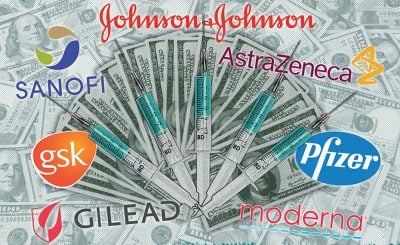Big Pharma Business Model Is Serious Obstacle to Wiping Out COVID-19: Report

New research released today by Global Justice Now examines the history of some of the leading corporations producing coronavirus medicines, warning that their business model is likely to make controlling the pandemic more difficult, despite the rapid production of vaccines.
The report, The horrible history of Big Pharma: Why we can’t leave pharmaceutical corporations in the driving seat of the Covid-19 response, finds that 6 of the biggest corporations in the coronavirus market generated $266 billion last year, with profits totalling $46 billion. Judged by revenue, Johnson & Johnson is more wealthy than rich countries like New Zealand and Hungary. Pfizer’s revenues are bigger than oil-rich Kuwait or Malaysia.
Yet these same corporations have taken billions of dollars from governments like the UK in research and manufacturing funding, as well as presales of medicines.
While this vast mobilisation of public money has been effective in producing vaccines in record time, the Big Pharma model means that these vaccines and treatments have essentially been “privatised”. That matters, campaigners claim, because it means rich countries being prioritised in terms of distribution, and it leaves governments with no leverage over the pricing of these drugs, making it harder to control coronavirus.
The report examines the history of some of the corporations producing these medicines:
- Pfizer and its UK distributor hiked the price of on anti-epilepsy drug which 48,000 NHS patients relied upon. As a result, NHS annual expenditure on their capsules rose from about £2 million to £50 million in a year. UK wholesalers and pharmacies faced price hikes of 2,300% – 2,600%.
- GlaxoSmithKlein was handed a $3 billion fine after it admitted to giving kickbacks to doctors in the US and encouraging the prescription of unsuitable antidepressants to children. Doctors and their spouses were flown to five-star resorts, given $750, and access to snorkelling, golf and deep-sea fishing.
- Gilead introduced a Hepatitis C drug to the US market at $84,000 per course. A US Senate investigation concluded: “it was always Gilead’s plan to max out revenue, and that accessibility and affordability were pretty much an afterthought.” Gilead corporate profits increased fivefold to $21.7 billion after the release of this and another very highly priced Hep-C drug.
- Pfizer and GSK produce a vitally important pneumonia vaccine, which health NGO MSF claim has earned the companies over $50 billion while 55 million children are unable to access to the pneumonia vaccine, largely due to high prices.
Campaigners claim these examples are inherent in a model driven by the need for very high returns, and that these trends are already at play during the pandemic:
- Pfizer has made no promise to limit profits, and has pre-sold over 1 billion doses to rich governments, representing just 14% of the world’s population.
- Moderna’s corporate executive have made tens of millions of dollars this year in automated share sales which former US regulators have called “highly problematic” and worthy of investigation. Moderna’s vaccine has been made with public money, yet the company is expected to charge between $64 and $74 per person for immunisation.
- Gilead made an extraordinary application for ‘orphan status’ on its drug remdesivir, which would have given it special protection owing to the fact the drug would be useful to a tiny number of patients – the very opposite of a pandemic. A public outcry led to withdrawal of the request.
- The vaccine being developed by Oxford University was to be produced on a nonexclusive, royalty-free basis. However, on entering a deal with AstraZeneca, the situation changed. The deal is now exclusive and while the company maintains it will not profit during the pandemic, it has failed to release details of its contract and how it calculates research costs.
Nick Dearden, director of Global Justice Now, said:
“What’s been achieved during this pandemic by dedicated scientists and researchers is incredible. It’s amazing that they’ve discovered these potential vaccines in just under a year. That’s thanks to unprecedented amounts of government money poured into research. But given the public has paid for most of this research, any vaccines that come out should be owned by the public – true people’s vaccines. That would mean we could get vaccines out to those who need them in a fair way, prioritising the most vulnerable wherever they live.
“It’s beyond disgusting that a group of wealthy corporate executives and hedge funds are using this opportunity to further enrich themselves. Sadly, coronavirus has shown, once again, that the way we research and develop new medicines is not fit for purpose. We have a bunch of companies more interested in raking in massive profits than they are in providing for the needs of people around the UK and around the world. We must change that.”
The report can be downloaded here.
*
Note to readers: please click the share buttons above or below. Forward this article to your email lists. Crosspost on your blog site, internet forums. etc.
Featured image is from Global Justice Now

